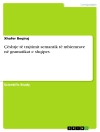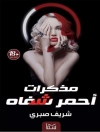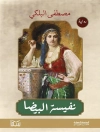As a result of migration, more than 25% of Romanian L1 speakers live outside of Romania and Moldova – mostly in other European countries, but also in America and Australia. In the meantime, many second-generation speakers have become part of this group. The situation has resulted in various different constellations of language contact, both within the group of Romance languages and amongst typologically different and unrelated languages. Despite the fact that these contact scenarios present a wide range of research perspectives, there have been hardly any studies on Romanian as a language of migrants up until now. The volume Romanian in the Context of Migration brings together contributions on the Romanian language in Europe and in North America in the context of current migration linguistics. It includes studies on Romanian in Canada, France, Germany, Italy, Portugal, Slovenia and Spain and on the Romanian of those who return to Romania and Moldova.
Über 25 % der Sprecher mit Rumänisch als L1 leben heute – infolge der Migration – außerhalb von Rumänien und der Republik Moldau, zumeist in anderen Ländern Europas, aber auch in Amerika und Australien. Inzwischen sind zahlreiche Vertreter der 2. Generation hinzugekommen. Aus dieser Situation ergeben sich unterschiedliche Konstellationen von Sprachkontakt, sowohl innerromanisch als auch mit typologisch verschiedenen und nicht verwandten Sprachen. All diese Kontaktszenarien eröffnen vielfältige Forschungsperspektiven. Dennoch gibt es bislang kaum Untersuchungen zum Rumänischen als Sprache von Migrantinnen und Migranten. Der Sammelband Romanian in the Context of Migration vereint Beiträge zum Rumänischen in Europa und Nordamerika im Kontext der aktuellen Migrationslinguistik. Er umfasst Studien zum Rumänischen in Deutschland, Frankreich, Italien, Kanada, Portugal, Slowenien und Spanien und zum Rumänischen der Rückkehrer.
Table of Content
Preface
Scenarios of migration
Georg Kremnitz (Wien)
La migration en tant que phénomène (souvent) de longue durée
Methods of migration research
Florin-Teodor Olariu (Iasi)
Homo migrans en tant qu’Homo narrans, ou la migraphie en tant que récit de vie
Romanian in migration contexts within Europe
Alexandru-Laurentiu Cohal (Iasi)
Appunti sul romeno e sull’italiano parlato della seconda generazione di migranti romeni in Italia
Felicia Dumas (Iasi)
Les Roumains de France : leur langue maternelle et leur pratique religieuse
Ioana Jieanu (Ljubljana/Ploiesti)
Translanguaging Phenomena in the Communication of Romanian Children in Slovenia
Timea Kádas Pickel et Elena Soare (Paris)
De la langue de la mère à la langue héritée : comment ne pas en perdre son roumain ? Aspects sociolinguistiques et grammaticaux de la transmission du roumain langue d’héritage
Aurelia Merlan (München)
El rumano de los inmigrantes de segunda generación en Alemania entre conservadurismo e innovación
Iulia Nica (Salamanca/Iasi/Bucuresti)
Contactos extraterritoriales recientes entre el rumano y otras lenguas románicas. Estudio de la comunicación por Internet
Danielle Omer (Le Mans)
Politiques linguistiques familiales : la transmission de la langue roumaine en contexte migratoire
Romanian in migration contexts outside Europe
Mirela Cherciov (Toronto)
Ten Years Later: Reflections on the Dynamics between Two Languages in Romanian Adult Migrants in Toronto
Anna-Christine Weirich (Frankfurt am Main)
Digital Pluriliteracies of Moldovans in Montréal
List of the authors
About the author
Priv. Doz. Dr. Aurelia Merlan lehrt Romanische Sprachwissenschaft an der Ludwig-Maximilians-Universität München.












